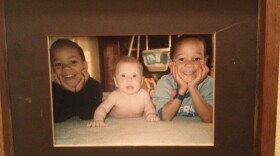Michigan’s new faith-based adoption law has come under intense criticism from those who claim it discriminates against same-sex couples. The law allows faith based adoption agencies to deny service to same sex couples, even if the agency receives state funds.
If you follow State of Opportunity regularly, which we hope you do, you'll notice this law contradicts a conclusion we’ve often reached: Michigan's child welfare system can't afford to turn away any capable parent.
In an effort to find out what this law really means for kids, families, and agencies, we’re taking a look from a child welfare perspective.
Does this law change anything?
Probably not, at least for a while. The right for faith-based agencies to not place children with same-sex couples was already a Department of Health and Human Services policy prior to it becoming law. Enforcing the law may be put on hold as it also looks like the American Civil Liberties Union will challenge the law.
Because of a federal lawsuit, Michigan isn’t exactly in a position to take any risks when it comes to throwing up roadblocks to families who may be willing to adopt from the foster care system. Right now, there’s no way to predict what kind of immediate impact the law will have on Michigan's child welfare system and kids in foster care.
What role do adoption agencies play, anyway?
Adoption agencies act as the middle man between kids up for adoption and parents looking to expand their family. Kids end up in the supervision of an adoption agency when:
- Their biological parent(s) give them up for adoption to a particular agency
- They were removed from their parents’ custody and put up for adoption while in foster care
Kids available for adoption via foster care are all put on a list that can be viewed here regardless of your sexual orientation. Those kids put up for adoption exclusively though one agency are only available to prospective adoptive parents approved by that agency.
This means that same-sex families, if denied service at certain adoption agencies, don't have access to all the kids currently up for adoption in Michigan. But, they do have access to most of them.
Faith based agencies have a lot of power:
One third of all taxpayer-funded adoptions in the state are through faith-based agencies. The law allows faith-based agencies to deny any parent that does not live in line with their faith, not just LGBT couples. This could include single parents or a married couple where one person was previously married and divorced. It could even cause problems for a straight couple of a different faith than the agency they’re working with.
In a list of over 80 licensing agencies on Michigan’s Adoption Resource Exchange website, only one lists themselves as LGBTQ-affirming.
Are same-sex couples a big part of the adoption picture?
Nationwide, LGBT couples are four times more likely to adopt than straight ones, and six times more likely to be foster parents. According to Lifelong Adoptions, gay and lesbian parents are raising four percent of all adopted children in the United States. This may not seem like very many, but the number of kids living with same-sex parents has jumped almost 100% in the last 12 years.
Is this decision good for kids in care?
Advocates like Tamya McGee, who has experience in the foster care system, says this law doesn’t have kids’ best interest in mind. There’s no evidence that suggests LGBT folks are unfit to be parents. In fact, same-sex couples are just as likely to support healthy child development as straight couples. Major child advocacy groups like the American Academy of Pediatrics, the American Counseling Association, the Child Welfare League of America, the National Association of School Psychologists, and the National Education Association voiced their opposition to this bill.
What about LGBTQ kids?
LGBTQ young people have some of the worst outcomes of all kids in foster care. They’re eight times more likely to attempt suicide than kids who identify as straight. This is largely because they don’t feel safe or accepted in care -- as many as 56% of LGBTQ youth would rather sleep on the streets than in their group or foster home. Having inclusive, LTBGQ-friendly foster homes for these kids is as important as ever.
That is also true with adoptions. Not all adoptions are successful, but Michigan doesn’t keep good track of broken adoption rates.
What options do same-sex couples looking to adopt have?
We are working on putting together some resources for these parents. If you’ve had a good or bad experience with a particular agency based on your sexual orientation, please let us know at infowire@michiganradio.org






